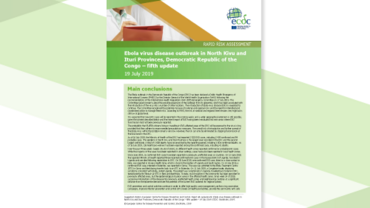Rapid risk assessment: Outbreak of Ebola haemorrhagic fever in Guinea
An outbreak of Ebola haemorrhagic fever is currently ongoing in Guinea. Eighty cases were reported, including 59 deaths. This is the first such outbreak in Guinea.
As of 23 March 2014, the situation in Sierra Leone is also under investigation, as there are concerns about the disease’s spread in the districts which border affected prefectures in Guinea.
EU citizens in Guinea are not at risk of becoming infected unless they are in direct contact with body fluids of infected persons or animals.
Executive Summary
The risk of tourists and visitors from the EU becoming infected with Ebola after a stay in Guinea is low, concludes an ECDC assessment on the outbreak of Ebola haemorrhagic fever currently ongoing in Guinea.
As of 22 March 2014, 80 Ebola cases were reported in Guinea, including 59 deaths, which represents a 74% fatality rate. This is the first such outbreak in Guinea and in Western Africa.
EU citizens in Guinea are not at risk of becoming infected unless they are in direct contact with body fluids of dead or living infected persons or animals. Avoiding such contact would effectively mitigate this risk.
It is unlikely, but not impossible, that travellers infected in Guinea could arrive in the EU while incubating the disease and develop symptoms while in the EU. These cases should immediately seek and receive medical attention and be isolated to prevent further transmission. Returning visitors from tropical countries that develop infectious disease symptoms within three weeks after return should always seek rapid medical attention and mention their recent travel to the attending physician.
Infection with Ebola viruses originating from Africa causes severe disease in humans. The onset of symptoms is sudden and includes fever, muscle aches, weakness, headache and sore throat. The next stage is characterised by vomiting, diarrhoea, rash and malfunction of liver and kidneys and in final stage, patients are developing multi-organ failure. The incubation period of the disease varies from 2 to 21 days. The case-fatality ratio is estimated to be between 50% and 90%






